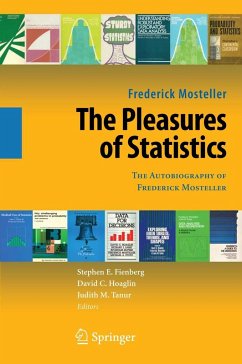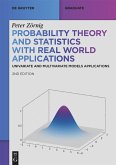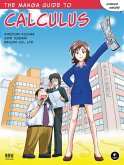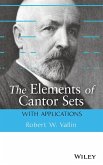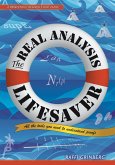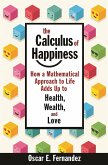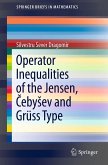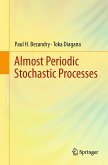Through his own voice, renowned statistician and educator Frederick Mosteller describes the many projects and events that constituted his more than 60-year career. From his humble beginnings in Western Pennsylvania, to becoming the founding chairman of Harvard University s Department of Statistics, Frederick Mosteller inspired many statisticians, scientists, and students with his unabashed pragmatism, creative thinking, and insatiable spirit for both learning and teaching. Now more than twenty years after its initial inception, Frederick Mosteller s story as he meant for it to be told is available to a new generation of statisticians and researchers.
This volume is a companion to Selected Papers of Frederick Mosteller, edited by Stephen E. Fienberg and David C. Hoaglin (Springer, 2006) and the earlier volume, A Statistical Model: Frederick Mosteller s Contributions to Statistics, Science, and Public Policy, edited by Stephen E. Fienberg, David C. Hoaglin, William H. Kruskal, and Judith M. Tanur (Springer-Verlag, 1990).
From his unique perspective, renowned statistician and educator Frederick Mosteller describes many of the projects and events in his long career. From humble beginnings in western Pennsylvania to becoming the founding chairman of Harvard University's Department of Statistics and beyond, he inspired many statisticians, scientists, and students with his unabashed pragmatism, creative thinking, and zest for both learning and teaching. This candid account offers fresh insights into the qualities that made Mosteller a superb teacher, a prolific scholar, a respected leader, and a valued advisor.
A special feature of the book is its chapter-length insider accounts of work on the pre-election polls of 1948, statistical aspects of the Kinsey report on sexual behavior in the human male, mathematical learning theory, authorship of the disputed Federalist papers, safety of anesthetics, and a wide-ranging examination of the Coleman report on equality of educational opportunity.
This volume is a companion to Selected Papers of Frederick Mosteller (Springer, 2006) and A Statistical Model: Frederick Mosteller's Contributions to Statistics, Science, and Public Policy (Springer-Verlag, 1990).
Frederick Mosteller (1916-2006) was Roger I. Lee Professor of Mathematical Statistics at Harvard University. His manuscript was unfinished at his death and has been updated.
This volume is a companion to Selected Papers of Frederick Mosteller, edited by Stephen E. Fienberg and David C. Hoaglin (Springer, 2006) and the earlier volume, A Statistical Model: Frederick Mosteller s Contributions to Statistics, Science, and Public Policy, edited by Stephen E. Fienberg, David C. Hoaglin, William H. Kruskal, and Judith M. Tanur (Springer-Verlag, 1990).
From his unique perspective, renowned statistician and educator Frederick Mosteller describes many of the projects and events in his long career. From humble beginnings in western Pennsylvania to becoming the founding chairman of Harvard University's Department of Statistics and beyond, he inspired many statisticians, scientists, and students with his unabashed pragmatism, creative thinking, and zest for both learning and teaching. This candid account offers fresh insights into the qualities that made Mosteller a superb teacher, a prolific scholar, a respected leader, and a valued advisor.
A special feature of the book is its chapter-length insider accounts of work on the pre-election polls of 1948, statistical aspects of the Kinsey report on sexual behavior in the human male, mathematical learning theory, authorship of the disputed Federalist papers, safety of anesthetics, and a wide-ranging examination of the Coleman report on equality of educational opportunity.
This volume is a companion to Selected Papers of Frederick Mosteller (Springer, 2006) and A Statistical Model: Frederick Mosteller's Contributions to Statistics, Science, and Public Policy (Springer-Verlag, 1990).
Frederick Mosteller (1916-2006) was Roger I. Lee Professor of Mathematical Statistics at Harvard University. His manuscript was unfinished at his death and has been updated.
From the reviews:
"This volume is a companion to Selected Papers of Frederick Mosteller (Springer, 2006) and A statistical Model: Frederick Mosteller's Contributions to Statistics, Science, and Public Policy (Springer-Verlag, 1990). ...It gives insights into the qualities that made Mosteller an enthusiastic instructor/teacher, prolific scholar, and a leader in statistical science. The volume showcases the personal details of a great scholar and gentleman -a human side! According to my quick counting, there are approximately 74 pictures of Mosteller-both individual and group shots, some of these historical in nature. ...The editors have done a superb job in compiling this volume and I think they deserve a vote of thanks for their time and effort to make this volume a reality and for sharing such interesting information about Frederick Mosteller. There is a wealth of information regarding teaching, research, and many other interesting topics; an enjoyable read!" (Technometrics, August 2010, Vol. 52, No. 3)
"All interested in statistical research, statistics in society, and academic life, particularly those for whom it is not too late to benefit from the wisdom in this book. ... the book has much to offer those interested in the teaching of statistics, cross-disciplinary as well as narrow sense statistical research and academic administration ... it is written for those who believe in the power of statistics to help make the world a better place. ... This combination of textbook and personal memoir is very appealing." (Terry Speed, International Statistical Review, Vol. 79 (1), 2011)
"The fact that Mosteller wrote over 350 papers and 50 books with over 200 coauthors shows his wide influence in the statistical community. The core of this book is an autobiography that Mosteller prepared in the late 1980s ... . This book provides a wonderful insight into Mosteller's life and I believe it would be an enjoyable read for bothstatisticians and people outside of the statistical community ... . One can learn much more about Mosteller's contributions, his life, and his many collaborative efforts." (Jim Albert, Journal of the American Statistical Association, Vol. 106 (493), March, 2011)
"I have spent the last fortnight reading Professor Mosteller's posthumously published autobiography, The Pleasures of Statistics. And what a pleasure it was to reacquaint myself with him! As always with Fred, I learned a great deal along the way. ... The Pleasures of Statistics is a joy. It offers an inside view of how a kind, gentle, wise and first-class mind works. ... It is too rich in wit and wisdom to rush through. And it is his last book." (Howard Wainer, Psychometrika, Vol. 76 (1), January, 2011)
"The book is a very interesting read. ... Beyond the interesting read are insights from Mosteller into the research and teaching processes. These are insights that many academics could benefit from. ... This provides valuable insights to a modern reader who typically would see only the polished research publications that came out at the end of the project. ... For someone at the beginning of his/her academic career, the book provides many sound pieces of advice that become apparent 'between the lines'." (David Bellhouse, Mathematical Reviews, Issue 2011 g)
"This volume is a companion to Selected Papers of Frederick Mosteller (Springer, 2006) and A statistical Model: Frederick Mosteller's Contributions to Statistics, Science, and Public Policy (Springer-Verlag, 1990). ...It gives insights into the qualities that made Mosteller an enthusiastic instructor/teacher, prolific scholar, and a leader in statistical science. The volume showcases the personal details of a great scholar and gentleman -a human side! According to my quick counting, there are approximately 74 pictures of Mosteller-both individual and group shots, some of these historical in nature. ...The editors have done a superb job in compiling this volume and I think they deserve a vote of thanks for their time and effort to make this volume a reality and for sharing such interesting information about Frederick Mosteller. There is a wealth of information regarding teaching, research, and many other interesting topics; an enjoyable read!" (Technometrics, August 2010, Vol. 52, No. 3)
"All interested in statistical research, statistics in society, and academic life, particularly those for whom it is not too late to benefit from the wisdom in this book. ... the book has much to offer those interested in the teaching of statistics, cross-disciplinary as well as narrow sense statistical research and academic administration ... it is written for those who believe in the power of statistics to help make the world a better place. ... This combination of textbook and personal memoir is very appealing." (Terry Speed, International Statistical Review, Vol. 79 (1), 2011)
"The fact that Mosteller wrote over 350 papers and 50 books with over 200 coauthors shows his wide influence in the statistical community. The core of this book is an autobiography that Mosteller prepared in the late 1980s ... . This book provides a wonderful insight into Mosteller's life and I believe it would be an enjoyable read for bothstatisticians and people outside of the statistical community ... . One can learn much more about Mosteller's contributions, his life, and his many collaborative efforts." (Jim Albert, Journal of the American Statistical Association, Vol. 106 (493), March, 2011)
"I have spent the last fortnight reading Professor Mosteller's posthumously published autobiography, The Pleasures of Statistics. And what a pleasure it was to reacquaint myself with him! As always with Fred, I learned a great deal along the way. ... The Pleasures of Statistics is a joy. It offers an inside view of how a kind, gentle, wise and first-class mind works. ... It is too rich in wit and wisdom to rush through. And it is his last book." (Howard Wainer, Psychometrika, Vol. 76 (1), January, 2011)
"The book is a very interesting read. ... Beyond the interesting read are insights from Mosteller into the research and teaching processes. These are insights that many academics could benefit from. ... This provides valuable insights to a modern reader who typically would see only the polished research publications that came out at the end of the project. ... For someone at the beginning of his/her academic career, the book provides many sound pieces of advice that become apparent 'between the lines'." (David Bellhouse, Mathematical Reviews, Issue 2011 g)

